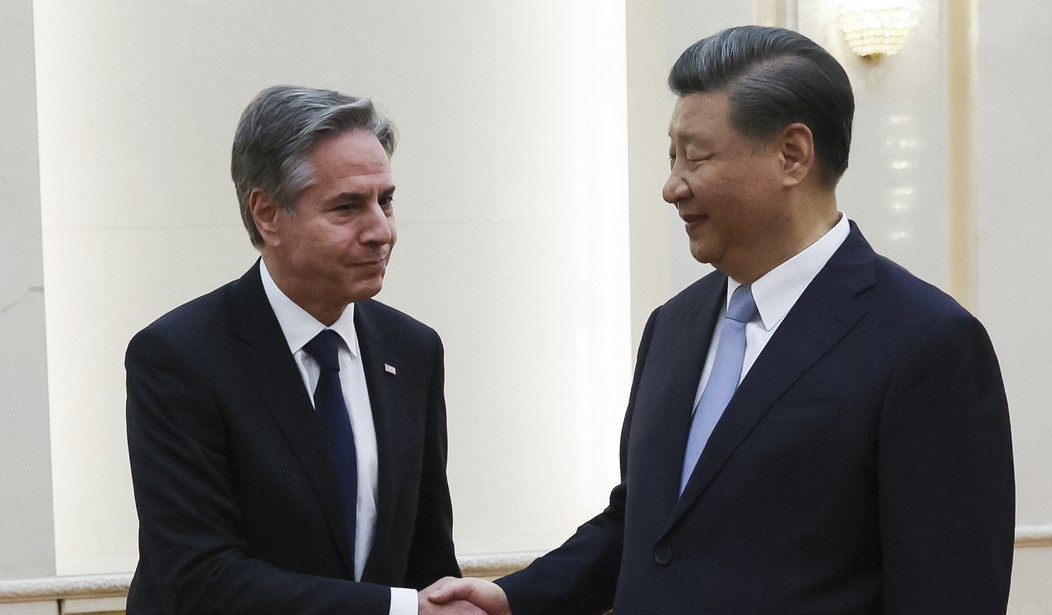It’s unclear exactly what the Biden administration was hoping for when Secretary of State Antony Blinken jetted off to China to speak with Wang Yi, the director of the Chinese Communist Party Central Committee Foreign Affairs Commission, and Foreign Minister Qin Gang. Ostensibly, the trip was supposed to “stabilize” U.S.-China relations by restarting the dialogue between the two nation’s militaries. But after two days of meetings — including an unscheduled meet-and-greet with President Xi Jinping — there was no substantive progress to report.
No matter how much lipstick the Biden administration wants to put on this pig, it failed to turn China into a prom queen.
This was no run-of-the-mill failure for Joe Biden’s foreign policy. Given the tense situation in the South China Sea and the Taiwan Straits where U.S. and Chinese military assets are within shouting distance of one another, and Chinese aircraft and ships are buzzing around U.S. ships and planes in an “unprofessional” manner, according to the Navy, having an agreed upon set of procedures how to handle close calls like this are a “confidence building exercise.”
Blinken’s primary task was to get the Chinese to agree to a military “hotline” — a task at which he failed.
“If we agree that we have a responsibility to manage this relationship responsibly, if we agree that it’s in our mutual interest, to make sure that the competitive aspects of the relationship don’t veer into conflict, then surely we can agree and see the need for making sure that the channels of communication that we both said are necessary, to do that include military to military channels,” Blinken said.
Setting up a crisis hotline is a top priority for Biden administration officials, who have had their calls ignored in the wake of dangerous confrontations between Chinese and U.S. militaries. This includes close calls in the air and on the South China Sea, a rare Chinese naval provocation in the Taiwan Strait and officials in Beijing refusing to pick up the phone when the U.S. reached out after shooting down a Chinese spy balloon in February.
Relations with China took a nosedive last August after then-Speaker of the House Nancy Pelosi visited Taiwan. China threw a major temper tantrum and has since ratcheted up the pressure on Taiwan with military exercises and fly-bys causing a lot of jittery nerves in Taipei. At that point, China broke off military dialogue with the U.S. because of this “challenge” to their sovereignty.
Indeed, the Chinese want the U.S. to grovel and beg forgiveness for this slap in the face.
Zhou Chenning, a researcher from the Yuan Wang military science and technology think tank in Beijing, said the Chinese military wouldn’t move forward with communications between the two militaries unless Washington shows “sincerity with respect” towards Beijing.
“Blinken’s China trip has effectively helped both sides stop the soured bilateral ties from getting worse, but it is still too early for the relationship between the two militaries to return to their previous stable state,” Zhou said.
“Beijing has the patience to wait and repeatedly stated its requirements [of the resumption] as the PLA representatives made clear at the recently ended Shangri-La Defence Forum in Singapore.”
Another Chinese expert, Shi Yinhong, an international relations professor at Beijing’s Renmin University, says rewarding Washington with a military hotline would be sending the wrong signal.
“China has resisted giving such absolute assurances because it fears that it would amount to letting the US keep boosting its support for Taiwan,” said Shi, referring to Washington’s increased arms sales and enhanced economic and diplomatic ties with the island.
“The PLA also sees the prevention of conflict as a top task, but it relies more on the experience of frontline troops on both sides.”
Shi said, “China would probably never agree to resume military-to-military communications between the two countries” as long as the current state of “U.S. discourse” continues.
That means that as long as the U.S. keeps getting in the way of China’s designs on Taiwan and as long as we continue to sell arms to Taipei, there won’t be much of a thaw in relations between us.










